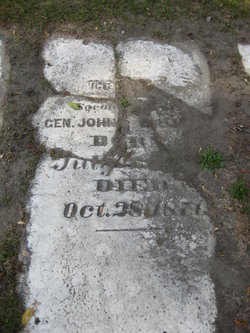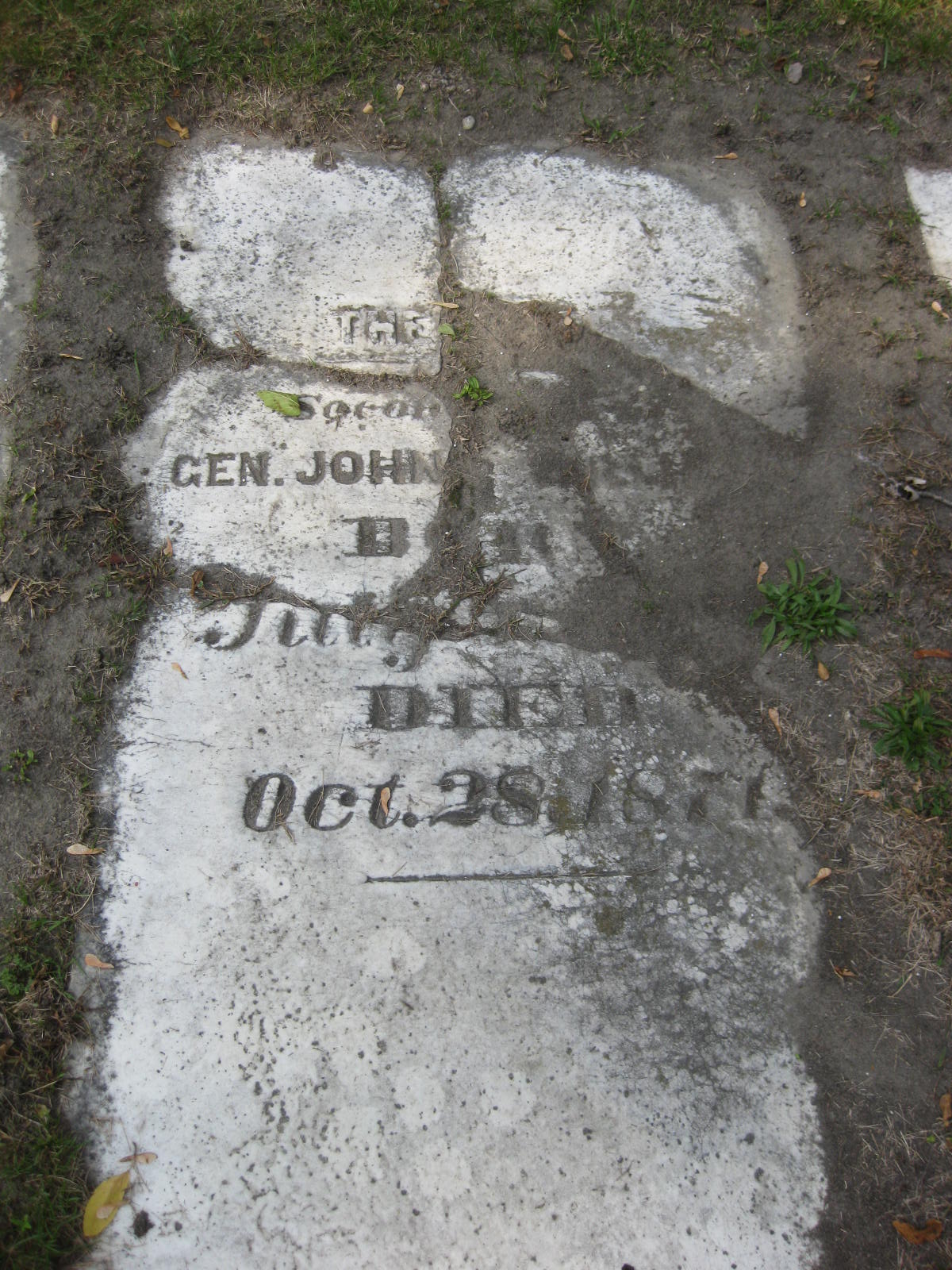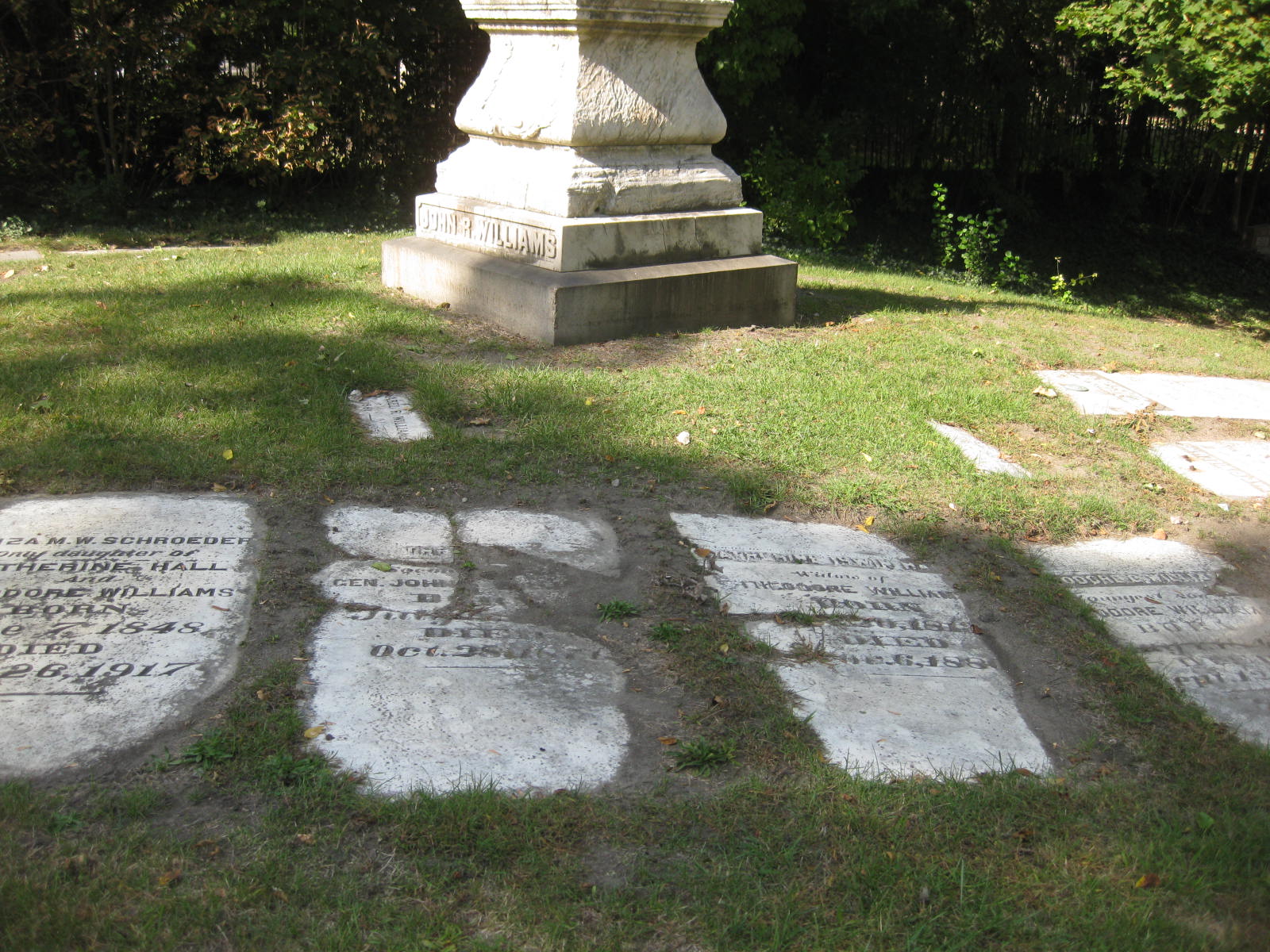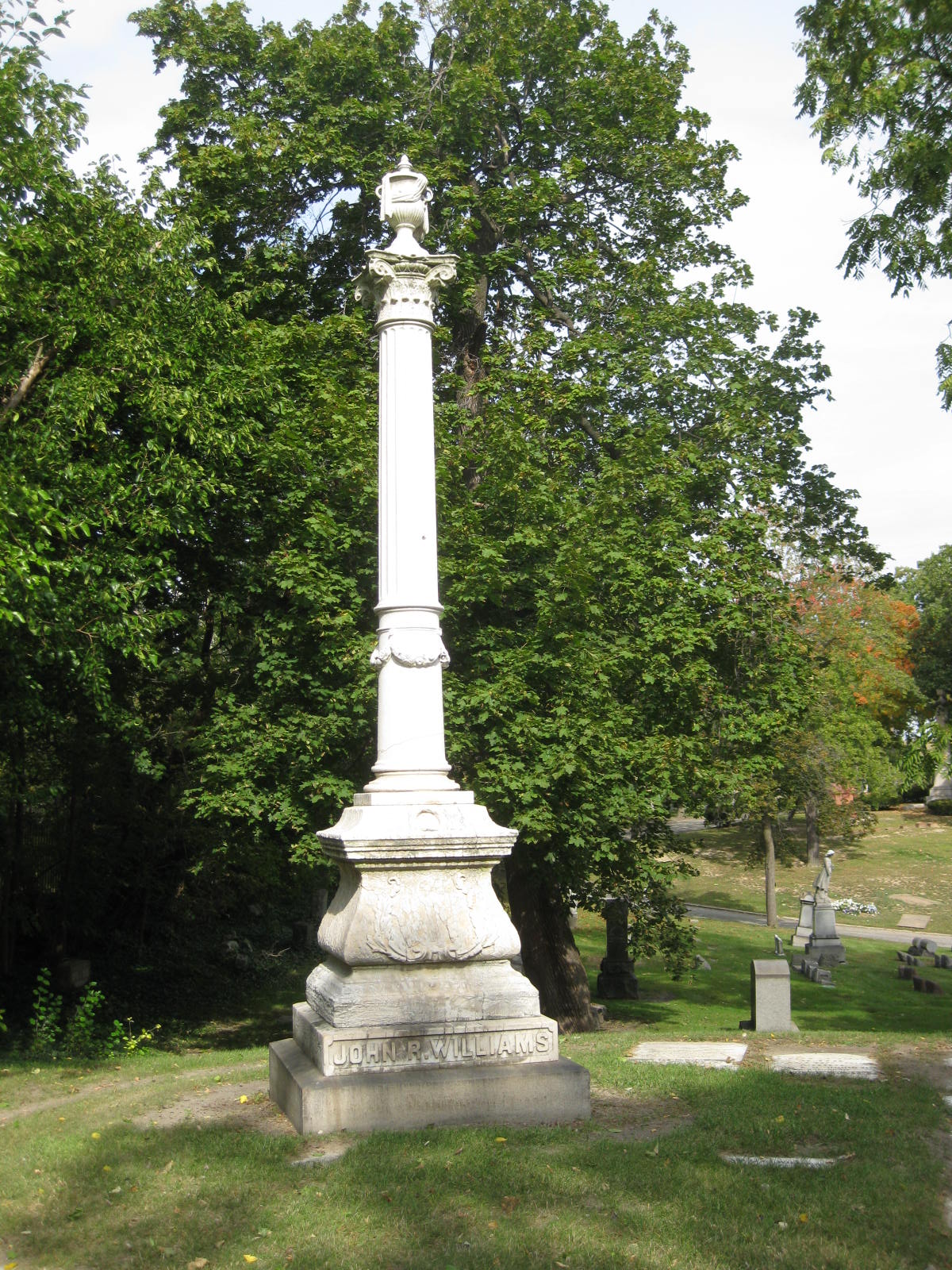Theodore, like all the sons of General John R. Williams, was baptized in Ste. Anne's Roman Catholic church, but after the memorable congressional campaign of 1823, in which Fr. Gabriel Richard was elected, his father withdrew from that church, of which he was a marguillere or trustee, and with all his sons worshiped in St. Paul's Episcopal church, which was organized in 1824. A full account of the circumstances can be found in the biography of William A. Fletcher, Michigan's first chief justice.
Theodore was a well educated man, but whether he was college bred is not remembered by his descendants. When he was nine years of age he went into his father's store, in which a large business, including the trade in furs, was transacted. As he grew older he became his father's chief factotum, and bought goods in New York and the east before he was seventeen years of age. During these early days the fur trade, and the Indian supplies for which furs were bartered, was the principal trade of the town, and he was greatly loved and esteemed by the Indians, and a chief named Sagena formally adopted him as his son and a member of his tribe.
The profits of the store were largely used by his father in the purchase of land, so that Theodore was really the main source of the wealth of the Williams family. He spoke French and the languages of several Indian tribes fluently, and was a favorite of both these races, as well as the English speaking inhabitants. When he reached his majority he was one of the most popular young men of the town.
After seventeen years' service in his father's store he was married in 1835 to Catherine Irwin Hall, a daughter of Commodore William Gaspe Hall of the British navy, whose home was at Rose Bank, four miles north of Amherstburg. The home of the young couple in Detroit, which is still standing, was on the south side of Jefferson avenue, just east of Beaubien street, next door to Siever & Erdman's carriage factory. Here nearly all their children were born, and here he died in the sixty-fourth year of his age.
Theodore was a tall, fine looking man being six feet in hight (sic) and well proportioned, with a medium complexion, black hair and whiskers, blue eyes and straight, large nose. At twenty five he began to grow gray, and at forty his hair was perfectly white, and as he grew older he increased in avoir-dupois until he weighed about 200 pounds.
In manner he was quiet, easy-going and genial, but when imposed upon was always ready to defend himself. In disposition he was liberal, generous and charitable, and was a public-spirited man, always solicitous for the advancement of the town.
He was a warm friend of Fr. Martin Kundig, whose devotion and humanity during the deadly cholera season of 1834 is a precious memory in the history of Detroit. Kundig worked hard on hospital work, expended all his own money in relieving the sufferings of the plague-stricken and voluntarily took charge of some thirty orphans. In the end he became a bankrupt, and finally went to Milwaukee. Theodore was his fiduciary agent in Detroit, and as Kundig saved money and made remittances he seconded his efforts to pay the priest's Detroit debts, in which he was finally successful.
It was only natural that the people of Detroit should bestow position of trust and honor on such a man as Theodore Williams, and in the offices he held he was always regarded as an upright and capable public servant. He was city register of deeds from 1830 to 1835; representative in the state legislature in 1838; chief engineer of the old fire department in 1838; justice of the peace in the forties for several terms; county clerk in 1841-2; clerk of the circuit court under Judge Daniel Goodwin in 1841-3; city treasurer in 1841-3, and alderman of the old Third ward in 1846-7, and again in 1859-60-1-2. In politics he was a whig and republican until the later fifties, when he became a democrat.
In the territorial days while serving as city register the work of the office was performed by himself without any deputy or other assistance. He was a fine, rapid penman, as the books written by himself amply attest. In writing on ruled paper he always wrote between the lines.
From 1852 to 1854 he was a partner in the firm of S. P. Brady & Company, forwarders and commission merchants, at the foot of Woodward avenue.
In 1854 he went into the newspaper business and after a brief experience lost nearly all his money. When the Daily Enquirer, an independent paper with whig proclivities, was established on Jan. 18, 1854, it was published by Hosmer & Williams, the latter furnishing the lion's share of the. capital. Hosmer was an able, popular, pleasant man, but of unsteady habits, and Williams procured the services of Fred Morley as associate eritor. Williams was business manager and also contributed to the editorial columns. The Enquirer was afterward consolidated with the Democrat, and its name changed to the Democrat and Enquirer. It was sold on June 30, 1855, to the Detroit Daily Advertiser, which then became a pronounced reublican paper.
Theodore sold his interest to Silas M. Holmes and R. F. Johnstone for $18,000, which were paid in notes, but were never liquidated. Mr. Williams thus paid that sum for his newspaper experience.
On Oct. 30, 1854, his father died and his share of the estate principally in land, was about $125,000. After that he never indulged in outside ventures. Although a fair lawyer he was never a regular practitioner, but sometimes pleaded in justice's courts, principally for clients who were his personal friends.
As an alderman he was progressive and clear headed, and always had the confidence of his constituents. Becoming convinced that steam fire engines were more effective than those operated by hand, he first advocated the bringing of a fire steamer to Detroit for purpose of making a test of its efficiency. In September, 1858, a Silsby engine was brought to Detroit and tried against No. 10 and No. 8 hand engines. The late Ben Vernor was foreman of No. 8, and in the race from the engine house to the Campus Martius he ran in his stockings. The two hand engines arrived first and threw the first streams of water, but the force and efficiency of the steamer more than offset the loss of time. In 1860 he introduced a resolution for the purchase of a steam fire engine, which was adopted. When he left the city hall, which was where the market building subsequently stood, he proceeded on his way home. He was followed by some rowdy members of the volunteer fire department, who were deeply incensed at his advocacy of the steam fire engine. At the corner of Jefferson avenue and Randolph street he was overtaken, beaten in a brutal manner and left insensible in the gutter. The perpetrators of the cowardly act were never discovered.
He left a widow and four children. His wife died in Detroit in 1880. His children were J. Benson Williams of Quebec, Que.; George W. Williams, who died in February, 1872; Theodore G. Williams, Detroit; and Eliza M. wife of Rudolph Schreader (sic) of New York city.
Source: The early bench and bar of Detroit from 1805 to the end of 1850, by Robert Budd Ross, Detroit, Richard P. Joy and Clarence M. Burton, publishers, 1907, pp 231-232
Theodore, like all the sons of General John R. Williams, was baptized in Ste. Anne's Roman Catholic church, but after the memorable congressional campaign of 1823, in which Fr. Gabriel Richard was elected, his father withdrew from that church, of which he was a marguillere or trustee, and with all his sons worshiped in St. Paul's Episcopal church, which was organized in 1824. A full account of the circumstances can be found in the biography of William A. Fletcher, Michigan's first chief justice.
Theodore was a well educated man, but whether he was college bred is not remembered by his descendants. When he was nine years of age he went into his father's store, in which a large business, including the trade in furs, was transacted. As he grew older he became his father's chief factotum, and bought goods in New York and the east before he was seventeen years of age. During these early days the fur trade, and the Indian supplies for which furs were bartered, was the principal trade of the town, and he was greatly loved and esteemed by the Indians, and a chief named Sagena formally adopted him as his son and a member of his tribe.
The profits of the store were largely used by his father in the purchase of land, so that Theodore was really the main source of the wealth of the Williams family. He spoke French and the languages of several Indian tribes fluently, and was a favorite of both these races, as well as the English speaking inhabitants. When he reached his majority he was one of the most popular young men of the town.
After seventeen years' service in his father's store he was married in 1835 to Catherine Irwin Hall, a daughter of Commodore William Gaspe Hall of the British navy, whose home was at Rose Bank, four miles north of Amherstburg. The home of the young couple in Detroit, which is still standing, was on the south side of Jefferson avenue, just east of Beaubien street, next door to Siever & Erdman's carriage factory. Here nearly all their children were born, and here he died in the sixty-fourth year of his age.
Theodore was a tall, fine looking man being six feet in hight (sic) and well proportioned, with a medium complexion, black hair and whiskers, blue eyes and straight, large nose. At twenty five he began to grow gray, and at forty his hair was perfectly white, and as he grew older he increased in avoir-dupois until he weighed about 200 pounds.
In manner he was quiet, easy-going and genial, but when imposed upon was always ready to defend himself. In disposition he was liberal, generous and charitable, and was a public-spirited man, always solicitous for the advancement of the town.
He was a warm friend of Fr. Martin Kundig, whose devotion and humanity during the deadly cholera season of 1834 is a precious memory in the history of Detroit. Kundig worked hard on hospital work, expended all his own money in relieving the sufferings of the plague-stricken and voluntarily took charge of some thirty orphans. In the end he became a bankrupt, and finally went to Milwaukee. Theodore was his fiduciary agent in Detroit, and as Kundig saved money and made remittances he seconded his efforts to pay the priest's Detroit debts, in which he was finally successful.
It was only natural that the people of Detroit should bestow position of trust and honor on such a man as Theodore Williams, and in the offices he held he was always regarded as an upright and capable public servant. He was city register of deeds from 1830 to 1835; representative in the state legislature in 1838; chief engineer of the old fire department in 1838; justice of the peace in the forties for several terms; county clerk in 1841-2; clerk of the circuit court under Judge Daniel Goodwin in 1841-3; city treasurer in 1841-3, and alderman of the old Third ward in 1846-7, and again in 1859-60-1-2. In politics he was a whig and republican until the later fifties, when he became a democrat.
In the territorial days while serving as city register the work of the office was performed by himself without any deputy or other assistance. He was a fine, rapid penman, as the books written by himself amply attest. In writing on ruled paper he always wrote between the lines.
From 1852 to 1854 he was a partner in the firm of S. P. Brady & Company, forwarders and commission merchants, at the foot of Woodward avenue.
In 1854 he went into the newspaper business and after a brief experience lost nearly all his money. When the Daily Enquirer, an independent paper with whig proclivities, was established on Jan. 18, 1854, it was published by Hosmer & Williams, the latter furnishing the lion's share of the. capital. Hosmer was an able, popular, pleasant man, but of unsteady habits, and Williams procured the services of Fred Morley as associate eritor. Williams was business manager and also contributed to the editorial columns. The Enquirer was afterward consolidated with the Democrat, and its name changed to the Democrat and Enquirer. It was sold on June 30, 1855, to the Detroit Daily Advertiser, which then became a pronounced reublican paper.
Theodore sold his interest to Silas M. Holmes and R. F. Johnstone for $18,000, which were paid in notes, but were never liquidated. Mr. Williams thus paid that sum for his newspaper experience.
On Oct. 30, 1854, his father died and his share of the estate principally in land, was about $125,000. After that he never indulged in outside ventures. Although a fair lawyer he was never a regular practitioner, but sometimes pleaded in justice's courts, principally for clients who were his personal friends.
As an alderman he was progressive and clear headed, and always had the confidence of his constituents. Becoming convinced that steam fire engines were more effective than those operated by hand, he first advocated the bringing of a fire steamer to Detroit for purpose of making a test of its efficiency. In September, 1858, a Silsby engine was brought to Detroit and tried against No. 10 and No. 8 hand engines. The late Ben Vernor was foreman of No. 8, and in the race from the engine house to the Campus Martius he ran in his stockings. The two hand engines arrived first and threw the first streams of water, but the force and efficiency of the steamer more than offset the loss of time. In 1860 he introduced a resolution for the purchase of a steam fire engine, which was adopted. When he left the city hall, which was where the market building subsequently stood, he proceeded on his way home. He was followed by some rowdy members of the volunteer fire department, who were deeply incensed at his advocacy of the steam fire engine. At the corner of Jefferson avenue and Randolph street he was overtaken, beaten in a brutal manner and left insensible in the gutter. The perpetrators of the cowardly act were never discovered.
He left a widow and four children. His wife died in Detroit in 1880. His children were J. Benson Williams of Quebec, Que.; George W. Williams, who died in February, 1872; Theodore G. Williams, Detroit; and Eliza M. wife of Rudolph Schreader (sic) of New York city.
Source: The early bench and bar of Detroit from 1805 to the end of 1850, by Robert Budd Ross, Detroit, Richard P. Joy and Clarence M. Burton, publishers, 1907, pp 231-232
Inscription
THEODORE
Second son of
Gen. JOHN R. WILLIAMS
died
Born
July 5, ????
Died
Oct. 28, 1871.
Gravesite Details
Marker cracked, in pieces, in poor condition
Family Members
Advertisement
Advertisement















